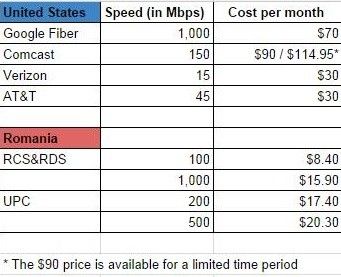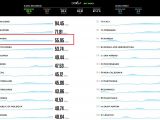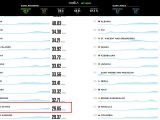As much as the United States preaches about being the “inventor” of the Internet and keeping a close grasp over its governance, the speeds customers can browse the Internet at are laughable.
The Net Index places the United States on the 25th spot in the world with an average speed of 29.85 Mbps. Not only is the connection speed lousy, but it’s also extremely expensive.
Take Romania, an Eastern European Country with about 20 million citizens, about as many as New York has. There are about 12 million Internet users in the country that benefit from an average Internet speed of 55.95 Mbps. In Bucharest, the country’s capital and the city with the largest population and the most Internet users, average speed was calculated at 74.4 Mbps. Needless to say, Romania ranks third in the world chart of Internet speeds, behind Hong Kong and Singapore.
No competition = no options
Not only does this small European country shame the United States when it comes to Internet speeds, but it also proves what a market with proper competition looks like. In Romania, any citizen can switch the Internet provider whenever they want and they have a few options to choose from.
This doesn’t happen in most US cities where Internet users feel trapped by being a client with one company or another. Comcast CEO Brian Roberts was recently trying to convince everyone that allowing the company to merge with Time Warner Cable was a good idea by perfectly explaining the situation competition is in the US.
“Both in video and in broadband, we don’t compete with Time Warner. They’re in New York, we’re in Philadelphia, they’re in LA, we’re in San Francisco. You can’t buy a Comcast in New York, you can’t buy a Time Warner in Philadelphia. So there’s no reduction in competition,” he said.
What does this result in? Well, it’s a fairly simple economics lesson – when there’s no competition, prices go up and often times quality goes down. When Google introduced Fiber to Austin, Kansas City and Provo, other ISPs were quick to react, lowering prices and increasing speeds.
Google Fiber – the exception
If Google Fiber were to expand in more cities, then these ISPs would be in big trouble since the company clearly has the best offer out there. The company’s gigabit Internet package costs $70 per month which is the best balance between value and quality in the country.
While Google’s story sounds nice, it barely managed to expand to three cities so far and it’s not covering these fully just yet. Building its own infrastructure is, of course, quite time consuming so the slow expansion is understandable to a level.
Unfortunately for US Internet users, however, things don’t look like this for the rest of the ISPs that have carefully divided the cities and states in carefully sliced strips, taking care not to overlap. This allows them to practice lousy services at extreme prices.
The best package at Comcast offers 150 Mbps for $90 per month for the first 12 months. This price is only available because it’s a time-limited offer. The actual monthly price for the Extreme 150 package is $114.95.
That means that Comcast’s best package is nearly 7 times slower than Google’s and costs 64 percent more.
Verizon’s offer is even sadder. The company offers a maximum download speed of 15 Mbps for $30. That’s 66 times worse than Google’s offer, albeit at less than half the price.
AT&T offers slightly better connection of up to 45 Mbps for $30 per month. Even so, it’s 22 times less than what Google Fiber brings to the table.
Competition = Good prices, even better speeds
Now as evidence of what competition in a market actually means, we’re going over to Romania, many miles apart.
One local player is RCS & RDS which offers various Internet packages. The smallest one provides Internet speeds of 100 Mbps for the 29 RON, or $8.4. Yes, you read that right. It gets better. The company also offers gigabit Internet – speeds of 1,000 Mbps for the mere price of 55 RON, which is $15.9 at today’s exchange rate.
That means that this one company offers the same Internet speeds as Google Fiber for $54 less. Even more showing is the difference between RCD & RDS and Comcast. For 7 times the speed, the Romanian company asks nearly $100 less.
And that’s because there’s competition. UPC, another major player has two packages available. The first one offers 200 Mbps for 60 RON ($17.4) and the second one 500 Mbps for 70 RON ($20.3). The prices are a bit steeper, but in the company’s defense, they do go a lot lower once integrated in complete packages with cable TV and a mobile voice subscription.
While the gigabit Internet isn’t available from this provider, it still offers more than most US companies do. There are other smaller providers peppering cities across Romania, pushing bigger companies to lower their own scores. There are also mixed packages offering cable TV, Internet and mobile data plans, but since we’re only looking at straight up broadband packages, we’re putting a stop to the list here.
This was a simple comparison illustrating why competition among companies is important, especially when it comes to Internet, which most of us use on a daily basis.
Even the Australians are jealous on the Internet speeds in Romania, as proven by this particular ad that you might enjoy.

 14 DAY TRIAL //
14 DAY TRIAL // 




